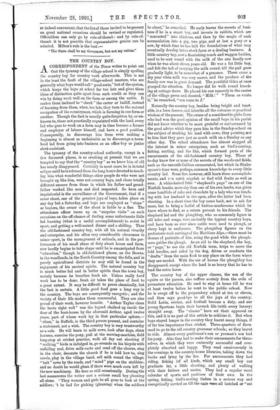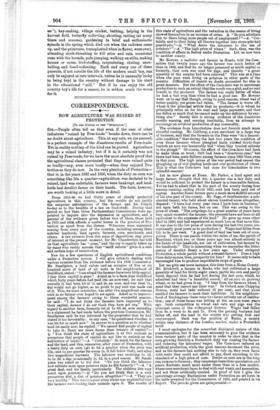THE COUNTRY BOY.
ACORRESPONDENT of the Times writes to point out that the tyranny of the village school is simply spoiling the country boy for country work afterwards. This is not in the least the fault of the village-school masters, who are generally what boys would call "good sorts," but of the system, which keeps the boys at school far too late and gives them ideas of distinction quite apart from such credit as they can win by doing work well on the farm or among the cattle. It makes them inclined to " cheek " the carter or bailiff, instead of learning from them, when, too late, they turn to the natural occupation of the countryman, which is farming in one form or another. Though the fact is usually quite forgotten by, or un- known to, those not practically acquainted with the land, every lad who goes to work on a farm may in time become a farmer and employer of labour himself, and have a good position. Consequently, to discourage him from even making a beginning is almost as undesirable as to discourage a town- bred lad from going into business as an office-boy or junior clerk-assistant.
The tyranny of the country-school authority, except in a few favoured places, is so crushing at present that we are tempted to say that the "country boy" as we knew him of old has nearly disappeared. Certainly in most cases he is in total eclipse until he is released from the long hours devoted to teach- ing him what wonderful things other people do who were not brought up like him, were not country boys, and chose totally different careers from those in which his father and grand- father worked like men and died respected. So keen and inquisitorial is the surveillance of the Government, that if a cover shoot, one of the greatest joys of boys, takes place on any day but a Saturday, and boys are employed as " stops " or beaters, the owner of the shoot is liable to a fine. The attendance officer turns up on "surprise visits" on such occasions on the off-chance of finding some unfortunate little lad learning (what is a useful accomplishment) to assist in sport, and getting a well-earned dinner and a shilling. Thus the old-fashioned country boy, with all his natural vivacity and enterprise, and his often very considerable cleverness in minor sport, in the management of animals, and in the per- formance of his small share of duty about house and farm, now hardly begins to take shape until he is emancipated from "education," though in old-fashioned places, on the Downs, in the woodlands, in the North Country among the fells, and in purely agricultural districts he may still be found in the enjoyment of his ancient spirits. The natural country boy is much better fed and in better spirits than the town boy, mainly because he breathes fresh air. Unless really hard work has to be done, fresh air takes the place of food to a great extent. It may be difficult to prove chemically, but the fact is certain. A little good food goes a long way in the country. The boys are consequently energetic ; and the variety of their life makes them resourceful. They are also proud of their work, however humble. "Arthur Taylor clean the boots right well" was the legend chalked up inside the door of the boot-house by the aforesaid Arthur, aged twelve years, part of whose work lay in that particular sphere,— " clean," in Suffolk, is the third person present, and contains a statement, not a wish. The country boy is very trustworthy as a rule. He will learn to milk cows, look after dogs, clean harness, exercise the pony, pull at the mowing-machine, field long-stop at cricket practice, walk all day out shooting if " walking " birds is indulged in, go errands on his bicycle with unfailing zeal, drive milk-carts and send off the churns, sing in the choir, decorate the church if he is told how to, sing carols, play in the village band, sell milk round the village, " bait " cows by the roads, and " mind " pigs on the stubbles ; and no doubt he would glean if there were much corn left by the new machinery. He does so still occasionally. During the last manceuvres the writer met a serious small boy gleaning all alone. "They women and girls be all gone to look at the soldiers: 't be bad for picking (gleaning) when the soldiers be about," he remarked. He early learns the secrets of ,busi- ness if he is a smart boy, and invests in rabbits, which are "converted" into chickens, and then by the magic of cash accumulation into a pig, two pigs, and at last a pony or a cow, by which time he has laid the foundations of what may eventually develop into a stock farm or a dealing business. A little country boy, now a flourishing coach and waggon builder, used to be sent round with the milk of the one. family cow when he was about eleven years old. He was a fat little boy, and felt the toil of carrying the milk round, till the pail grew gradually light, to be somewhat of a penance. There came a dry year when milk was very scarce, and the produce of the family cow was in great demand. The youthful Giles at once grasped the situation. No longer did he walk round knock- ing at cottage doors. He placed his can squarely in the centre
of the village green and shouted, " ! " "Them as wants it," he remarked, "can come to /I"
Naturally the country boy, besides being bright and tract- able, is a born farmer, and inherits all the cuteness or p actical wisdom of the peasant. The owner of a considerable glebe farm who had won the good opinion of the small boys in his parish did not know whether to be more grateful or embarrassed by the good advice which they gave him in the Sunday-school on the subject of stocking his land with cows, they pointing out to him that they gave just as much milk on a Sunday as any other day. The school attendance has almost stopped all the interest in minor enterprises, such as bird's-nesting, fishing, nutting, and the like, which formed parts of the amusements of the old-fashioned country boy. Those of to-day know few or none of the secrets of the woods and fields, such as the uncouth Caliban enumerated, but which in Shake- speare's time were, perhaps, common knowledge to every little country lad. Some few, however, still learn these accomplish- ments, and crIn catch crayfish or find wild fruits as well as ever. A white-haired little "shepherd's page" on one of the Norfolk heaths, more shy than one of his own lambs, was given some handfuls of cake and chocolate by a lady who was lunch- ing with her husband in the open, after the latter had been shooting. In a short time the boy came back, not to ask for more, but to bring a hatful of button-mushrooms which he knew where to find, as a return present to his friends. The shepherd lad and the ploughboy, who so commonly figure in old tales and songs, were anciently the typical country boys, and have been so ever since cattle were used to plough, or sheep kept in enclosures. The ploughboy figures on the prehistoric rock carvings of the Maritime Alps,—there must be dozens of portraits of him, using the goad while the plough- man guides the plough. As an aid to the shepherd, the boy, or "page," to use the old Norfolk term, helps to move the fold hurdles, and aided by the dog, drives or conducts the " drafts " from the main flock to any place on the farm where they are needed. With the use of horses the ploughboy has disappeared, except where the land is so heavy that he has to lead the extra horse.
The country boy of the upper classes, the son of the squire or the parson, also suffers acutely from the evils of premature education. He used to stay at home till he was at least twelve before he went to the public school. Now he is swept off to the preparatory school at ten or eleven, and then says good-bye to all the joys of the country. Solid Latin, cricket, and football become a duty, and our young Spartans begin their barrack life (with every luxury) straight away. The " classes " have set their approval on this, and it is no part of this article to criticise it. But when boys stayed longer in the country they learnt many things, if of far less importance than cricket. Three-quarters of them used to go to the old country grammar schools; so they learnt to ride. Almost every gentleman's son or yeoman's son had his pony. Also they had to make their amusements for them, selves, in which they were eminently successful and com- pletely absorbed and happy. They read omnivorously in the evenings in the country-house libraries, taking down the books and lying by the fire. For amusements they had riding, fishing (of all kinds, which any small boy can graduate in), a little shooting, and plenty of walking with their fathers and uncles. They had a regular rural calendar of sports and pastimes of their own. In the spring, fishing, bird's-nesting (taken in a serious way and energetically carried on till the eggs were all hatched or "sat
on"), bay-making, village cricket, bathing, helping in the harvest field, butterfly collecting, shooting, ratting (at many times and seasons), gardening (a brief and enthusiastic episode in the spring which died out when the radishes came up, and the primroses, transplanted when in flower, were over), attending stock-threshing to kill mice and rata, occasional runs with the hounds, pole-jumping, walking on stilts, making houses or caves, bird-stuffing, carpentering, skating, snow- balling, and fossil-collecting. Each and every one of these pursuits, if not outside the life of the modern small boy, can only be enjoyed at rare intervals, unless he is unusually lucky in being kept in the country without damage to his start in the educational "mill" But if he can enjoy the old country boy's life for a season, he is seldom much the worse for it.



















































 Previous page
Previous page